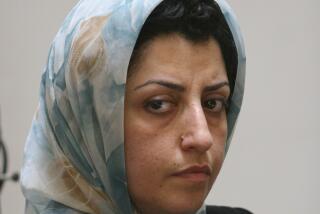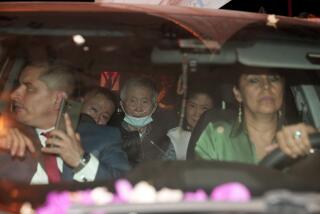From the archives: Nobel Peace Prize Goes to Tibet’s Dalai Lama
The Dalai Lama, exiled spiritual leader of Tibet, was named winner of the 1989 Nobel Peace Prize on Thursday.
The Norwegian Nobel Committee, which announced the award in Oslo, cited the Dalai Lama’s nonviolent struggles to regain autonomy for his homeland from China and his advocacy of “peaceful solutions based upon tolerance and mutual respect in order to preserve the historical and cultural heritage of his people.”
Egil Aarvik, chairman of the Nobel Committee, said the award was intended to send a message of support and a plea for nonviolence to all those struggling for human rights and national liberation across the globe, including China, the Soviet Union and Eastern Europe.
Senior aides in the Dalai Lama’s exile government, based in India, declared the prize an important morale boost for the Tibetan cause as well as a slap at China in the aftermath of the massacre of pro-democracy demonstrators in Beijing in June. Chinese officials expressed irritation, accusing the Norwegian Nobel Committee of meddling in China’s internal affairs.
At a press conference in Newport Beach, where he has been attending a weeklong peace conference, the world’s best-known Buddhist leader, revered by his followers as a god-king, shrugged off the award.
“Many friends were overjoyed,” said the Dalai Lama, 54, grinning broadly. “I myself, not so much. . . . I’m still just a Buddhist monk, no more, no less.”
But “from the Tibetan point of view, it’s fantastic,” said Tenzin Geyche Tethong, his personal secretary for 25 years. “Indirectly, it’s a tremendous morale boost and sort of worldwide recognition of the Tibetan tragedy.”
The Dalai Lama, clad in a maroon and saffron robe and plastic sandals, indicated to reporters that he might spend the $469,000 prize on famine relief or peace studies. The peace prize, the first to be won by an Asian, will be formally awarded Dec. 10 in Oslo.
The Dalai Lama and his staff said they hope the prize will help focus attention on the plight of the people living inside Tibet--a Himalayan region more than three times the size of Texas that, under the label “‘Tibet Autonomous Region,” has been firmly controlled by the Chinese since 1951.
According to the Dalai Lama’s aides, 1.2 million Tibetans have died as a result of the Chinese occupation and more than 6,000 monasteries have been destroyed. Beijing, which imposed martial law on the region in March, vigorously disputes these figures.
(When discussing Tibet, the Dalai Lama means the whole area of China traditionally inhabited by Tibetans, including the Tibet Autonomous Region (population: about 2 million), China’s Qinhai province and Tibetan-inhabited areas of several adjacent provinces. Using this definition, he counts 6 million Tibetans.)
Perhaps most of all, Tibetans fear “cultural genocide” from the Chinese who have moved into areas that have been dominated by Tibetans and threaten to overwhelm them, the Dalai Lama said.
A spokesman for the Chinese Embassy in Oslo voiced displeasure Thursday over the Nobel Committee’s decision.
“To give the peace prize to the Dalai Lama is a clear interference in the internal affairs of China,” embassy spokesman Wang Guisheng told reporters. “The decision has deeply hurt the Chinese people’s feelings.
“Tibet has been an indivisible part of Chinese territory for years,” Wang said. “Tibetan affairs are entirely the internal affairs of China.”
Voice for Exiles
From his base in Dharamsala, India, the Dalai Lama has functioned as the spiritual and political leader of Tibetans left behind as well as 100,000 Tibetans in exile. He has formed what he calls a democratic constitution of Tibet, a unique blend of constitutional monarchy, popular democracy and Buddhist principles of nonviolence and tolerance.
Until the bloodshed in Beijing last summer, he had engaged in indirect talks with the Chinese on the future of his homeland.
In June, 1988, the Dalai Lama abandoned his demand for the independence of Tibet in favor of demilitarization by China. Speaking to the European Parliament, he called for a self-governing Tibet, with China in charge of defense and foreign affairs.
China rejected the plan as an “attempt to distort history.”
‘Desperate Feelings’
“If Tibet took arms, followed the violent course, that’s almost like suicide,” the Dalai Lama said Thursday. “I understand that there are desperate feelings,” he added, but “I always believe that nonviolence is something important.
“The best way to solve human conflict is through understanding, not fighting,” he continued. “Patience.”
In announcing the award, the Nobel Committee cited the Dalai Lama’s rejection of violence and his preachings of respect for all living things. It praised his “constructive and forward-looking proposals for the solution of international conflicts.”
The prize represents moral support for the Dalai Lama’s conciliatory approach to negotiations with China, a message perhaps aimed partly at the more militant Tibetans.
Pressure From Militants
In the months since the Chinese army’s brutal suppression of the pro-democracy student movement in Beijing, many young Tibetan monks and students have been openly challenging the Dalai Lama and arguing for a more militant approach.
Despite the Dalai Lama’s teachings of nonviolence, bloody clashes with Chinese authorities have occurred in Lhasa, the Tibetan capital, over the past two years.
Up to 30 people were killed in March. Demonstrations were reported as recently as last month.
But, even then, the Dalai Lama resisted the appeals of his young followers to turn away from four decades of nonviolence toward greater militancy.
In addition, in all recent public appearances, the spiritual leader has pushed his five-point peace proposal for Tibet--most recently during his address last year to the European Parliament.
The proposal, in part, calls on China to abandon an internal migration policy that, according to the Tibetans, threatens their very survival; to stop using Tibet as a site for producing nuclear weapons and dumping nuclear waste, and to begin “earnest negotiations on the future status of Tibet.” When discussing Tibet, he means the whole area traditionally inhabited by Tibetans, including China’s Qinghai province.
Until the announcement of the Nobel Prize, many Tibetans felt that the outside world had lost interest in their cause.
Disappointment With World
“There has been a strong feeling among our people that there is no international recognition of our struggle anymore--a feeling of disappointment leading to serious discussion of the need to take a more violent approach,” said Tashi Wangdi, a top aide to the Dalai Lama and education minister in the exile government.
“And this has been causing a lot of concern to His Holiness, who has been arguing very strongly otherwise.”
Egil Aarvik, chairman of the Norwegian Nobel Committee, said the Buddhist leader was nominated in previous years, “but events in the East, particularly in China in the last year, have made the Dalai Lama’s candidacy more timely now than before.”
Harald Boeckman of the Institute of East Asian Affairs at Oslo University said the prize could strengthen the Dalai Lama’s bargaining position “and speed up the process toward a settlement” by bringing about “a creative and productive chaos.”
The religious leader also has been active in many other international causes, among them efforts to link science and religion--specifically Buddhism. It was that mission that brought him to Newport Beach this week, where he has dealt with questions on topics such as anger, reincarnation and humility before an audience of psychologists, scientists and New Age devotees.
Asked to describe the meaning of the Dalai Lama to his people, his aide Wangdi said: “To Tibetans, His Holiness is everything--their god, their king.”
In exile, most Tibetans adapt, but “never let go of their faith in the Dalai Lama,” said Tseten Phanucharas, 42, who left Tibet in 1958 and is now administrative director of St. John’s Hospital in Santa Monica. “He’s the ultimate example of the way I want to be: compassionate, total honesty, simplicity, humility and wisdom.”
Known to be extremely accessible, the Dalai Lama will stop and talk to almost anyone who stares at him, she said.
“You can’t help when you’re around him to feel happy,” said Kal Wangden, 38, of Anaheim, a Tibetan who volunteered to help guard the Dalai Lama and his entourage of eight during their stay in Orange County.
Throughout the huge Tibetan community in Dharamsala, India, where the Dalai Lama established his headquarters in 1959, celebrations were planned Thursday night in his honor. But none of them was officially sanctioned.
Smith reported from Orange County and Fineman from New Delhi. Times staff writer David Holley, in Beijing, contributed to this article.
DETERMINED MAN: Nobel winner is compassionate but also tough. Page 17
TIBET: A REGION IN CRISIS
The Dalai Lama comes from a region that has been in repeated conflict with Beijing. Independence movements have been active, and violence has broken out sporadically during protests since 1987. Here are some basic facts: The Land--Covering 471,662 square miles, remote region comprises snow-covered mountains and wind-swept plateaus that are highest in world. Parts of it have never been explored. Climate is dry and cold.
The People--Population about 2 million, mostly in south, including farmers, nomads, townspeople. Dialects related to Burmese. Religion is Lamaism, a branch of Buddhism. About one-fifth of people are lamas (monks).
Government--Autonomous region of China, with capital at Lhasa (population 84,000). Although in theory self-governing, it is under strict control of China.
Economy--Mostly agricultural. Main crop is barley; chief export is wool. Cloth-weaving and carpet-making are household industries.
History--Became powerful kingdom in 7th Century AD. Invaded by Mongols in late 13th Century. Dalai Lama became civil authority and ruler in 17th Century. Fell under Chinese control in early 18th Century. Rival Panchen Lama enthroned by China in 1944. Chinese Communist troops invaded in 1950. Sino-Tibet accord in 1951 promised autonomy, but China tightened grip in 1950s and 1960s. Tibetans attempted to revolt in 1959, were crushed, and Dalai Lama fled into exile.
Recent Events--Since Oct. 1, 1987, Dalai Lama’s followers have held four major demonstrations in Lhasa against Chinese rule. All were broken up by authorities. At least 30 people died, most killed by police.
Source: World Book Encyclopedia
More to Read
Start your day right
Sign up for Essential California for news, features and recommendations from the L.A. Times and beyond in your inbox six days a week.
You may occasionally receive promotional content from the Los Angeles Times.






